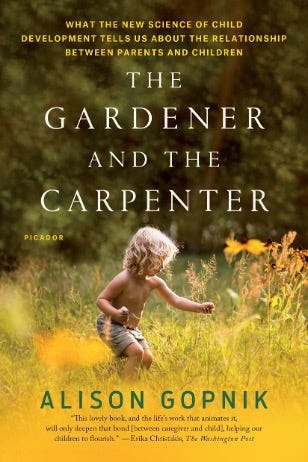I got into developmental research by accident, really. During my PhD began studying behavior genetics, and for those familiar with the headlines in the field, behavior genetics has a lot to say about the relationship between parents and children. By way of being interested in behavior genetics, I was led into developmental questions.
So it went that I became intensely interested in child development more broadly, and have been teaching university courses on lifespan development and seminar courses on child development since grad school. And it was during graduate school that I discovered the work of Alison Gopnik, and her book, The Gardener and The Carpenter: What The New Science of Child Development Tells Us About the Relationships Between Parents and Children.
Gopnik’s book holds many top accolades from me. It’s my most read book ever – three times – one of my most recommended books of all time, and definitely one of my favorite popular science books overall. And I’ve used as a primary text in two of my seminar courses to the approval of my students.
The Gardener and The Carpenter takes a fresh angle to a common debate in developmental psychology, especially among behavior geneticists. Rather than getting into a fruitless debate of whether parents matter, Gopnik focuses on how parents matter – because it’s obvious they do, just not in the way many behavior geneticists like to argue about.
Her thesis is that, nodding to the behavior geneticists, the specifics of who your kid turns out to be is not going to be intricately shaped to your precise parenting behaviors. Playing Mozart isn’t going to make them a classical musician. You can’t be a successful “carpenter” of your children. But you can be a successful “gardener” by creating nourishing environments and trusting relationships that allow your children to flourish to their fullest potential. All the while enjoying the true job of being a parent – to love your children.
Fusing evolution and classic experimental developmental psychology, Gopnik delivers a research-packed book demonstrating the ways that good “gardens” help children thrive. Her lab at UC Berkley is truly churning out fascinating and clever experiments to understand how babies process information, who they trust, and what aspects of relationships babies and children attend to most.
The crux is that the relationship between parents and children is one of promoting learning. After all, the whole point of childhood is to learn. By being a good gardener, you can create environments and relationships that allow children to learn the best they can – which is important since kids learn and problem solve differently than adults. It’s a fascinating take.
Gopnik delivers a highly engaging book that’s a breeze to read. It’s a book everyone should read, but especially the behavior genetics and others who claim that parenting has no impact on children’s outcomes just because traits are heritable.
Published: August 2016
Publisher: Farrar, Straus and Giroux
Format: Paperback
If you think this sounds interesting, bookmark these other great reads:
Conscience: The Origins of Moral Intuition by Patricia Churchland (2019)
Cribsheet: A Data-Driven Guide to Better, More Relaxed Parenting, from Birth to Preschool by Emily Oster (2019)
You might also like…
This post contains affiliate links, allowing me to earn a small commission when you purchase books from the link provided. There is no cost to you, and this will allow me to keep this newsletter free and open to all. Happy reading!







Fascinating! Thank goodness we have smart people like you to explain this science stuff to me. I love the concept of gardening instead of carpenter-ing.